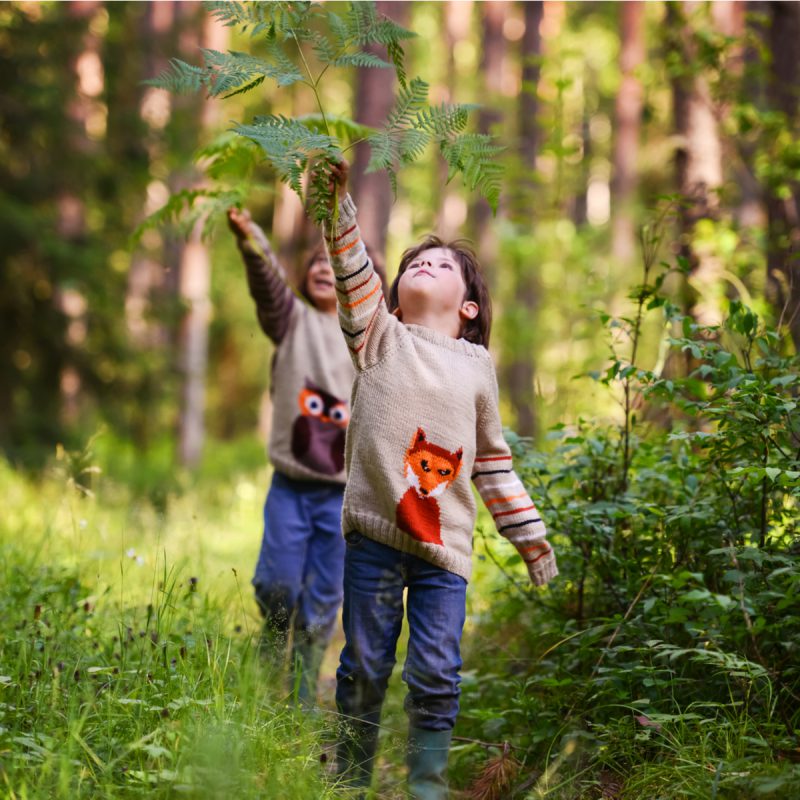Children are creative, imaginative beings. Their wonder, awe, and curiosity are a natural reaction to reality. Over time, if their eager, inquisitive approach to the world is smothered, the thrill of exploring slowly recedes, and learning can become burdensome and less enjoyable.
As a society, it’s our duty to pass down knowledge to new generations. Our education system has the power to shape the minds of humanity, which is an enormous responsibility, but also an opportunity to restructure the way humans interact with one another and the world. We can teach children how to live lightly on the planet, develop self-awareness, evolve their emotional intelligence, and approach all living things with respect.
The Disconnect
According to the National Wildlife Federation, the average American child spends less than 30 minutes outdoors engaging in unstructured play, but is exposed to about seven hours of screen time per day. The Wilderness Society suggests that only ten percent of teens between 13 and 18 spend time outdoors every day. The majority of youth today are stagnant, stressed out, overstimulated by electronics, learning inside classrooms, and missing a key part of their development: a connection and relationship with nature.
Connecting Children with the Outdoors
Outdoor education and exposure to nature has been shown to promote the overall well-being of all humans, but the benefits for children in particular are overwhelmingly positive.
The National Wildlife Federation and the Natural Learning Initiative have gathered results of various studies related to connecting children to the outdoors. They’ve concluded that children who spend time in nature tend to experience the following positive impacts:
- Enhanced cognitive abilities
- Improved mental performance, vitality, and academic performance
- Supported creativity and problem solving
- Reduced ADHD symptoms
- Increased physical activity
- Improved nutrition
- Improved eyesight, specifically distance vision
- Deeper connection to self, others, and the natural world
- Decreased stress, which reportedly falls within minutes of exposure to green space
- Improved social interactions, encouraging community and development of relationships
The Movement Toward Outdoor Education
Based on what we know about the benefits of exposure to nature, outdoor education experiences have the potential to drastically shift the way we educate our youth. Outdoor education provides hands-on opportunities to grasp concepts that are only mimicked in classrooms, creating safe situations to step outside comfort zones for mental and emotional growth while weaving physical activity into the lesson to keep kids engaged, which could potentially eliminate the need for specific Physical Education courses.
Outdoor education is a space where learning can come alive. Growing food in a garden is a comprehensive health lesson and daily physical activity. Identifying plants, checking pH balances of water, observing clouds, and soil testing are science concepts that can be touched instead of read about in textbooks. Learning to make paint with various plants and other natural substances is an art lesson. Building outdoor structures brings mathematics and architecture to life. Sharing meals, singing songs, and creating new games encourages relationship building. Breathing fresh air and exposure to green space calms the mind.
Children can be supported and encouraged through outdoor education. Like fueling a flame, those sparks of creativity can be experimented with outside the walls of a classroom. Imagine the innovation that could result from providing humans the space to fully embrace their potential, and the courage to reach outside their comfort bubbles knowing they are safe to try again if they are unsuccessful the first time.
Everything we need to improve our minds, bodies and spirits can be found in nature. If we want to provide these next generations with the wisdom the Earth holds for us, our focus needs to be on preserving it, so that it can continue to support our evolution and the vitality of humanity.
Do you remember the last time you had an outdoor experience with your children? Make new memories and give a new experience to your children.

